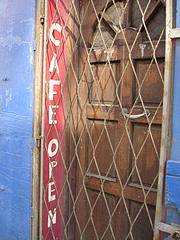Change is like your favourite café closing down.
Imagine that every day of your student and working life you went to the same cafe on  the way to work. The coffee is great and over time you get to know the people that work there and make friends and acquaintances with the others patrons. One day without explanation you find it closed forever. An accompanying friend assures you that the coffee in the café down the road is just as good, the décor better and it is even closer to where you work. Somehow though, this
the way to work. The coffee is great and over time you get to know the people that work there and make friends and acquaintances with the others patrons. One day without explanation you find it closed forever. An accompanying friend assures you that the coffee in the café down the road is just as good, the décor better and it is even closer to where you work. Somehow though, this
doesn't remove the feelings of sadness and loss. It is also likely that on your first visit to the new place you will be more critical, more judgemental and less accepting than is really rational. These feelings often flow on through the rest of the day. For the rest of the week you look wistfully at the little café where you felt 'at home'. Over time though, the feelings fade and new behaviour takes its place.
Most change is like the closing of the café.
I spent a few days recently with a small leadership team talking about the strategic options facing them and their organisation. They have a proud history and some amazing successes to their credit. But much of that is now in the past. Sales are falling and their major customer seems to almost hold them in contempt. The industry they once served has splintered and most of it is now in China in a low cost / no frills paradigm. Their shareholders are becoming increasingly insistent that they move into new areas of service or they will take the investment elsewhere. If all of this is true staying where they are is a very risky idea indeed.
All of this is known and accepted by the leadership team but still they find it difficult to change. Why? Because over time we build up patterns in our brains about how things should be. These patterns are like friends. They, like us with our the café, have become very comfortable with them. As they plan their future they look at the future options with a very critical eye. Despite knowing the risks of staying where they are, they spend more time than they should staying
with what is familiar. Change creates feelings of sadness.
The reality is that they have to move on knowing that probably the future will be more about a lot of coffee in a lot of different cafes and that nothing in the future is likely to replace the original. They and their strategy need to replace the organisational equivalent of loss of the café with a shrewd judgement of good coffee. If that kind of refocusing occurs then constant change
will be as a good thing. Constant change after is what what keeps us young and vibrant. What itshould mean is that, over time, there will be many great coffees and new and interesting experiences with both old and new friends.

0 Comments:
Post a Comment
<< Home